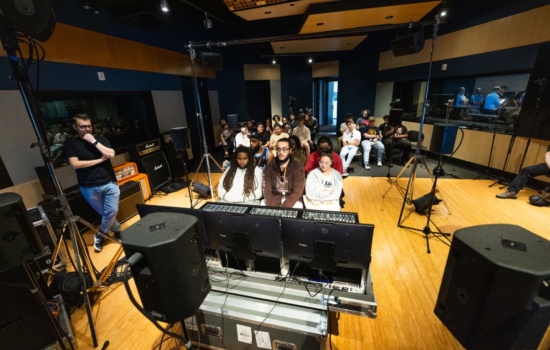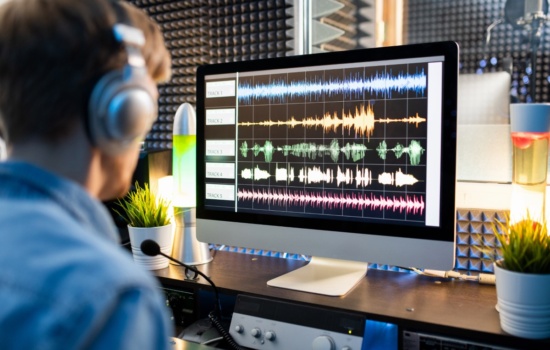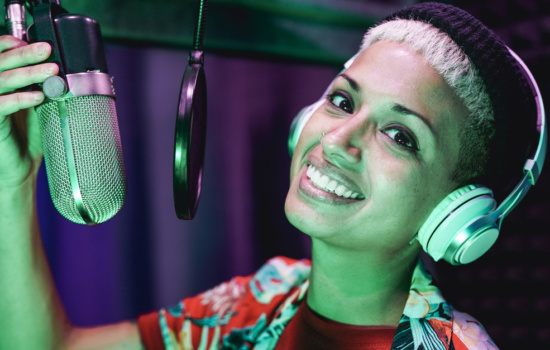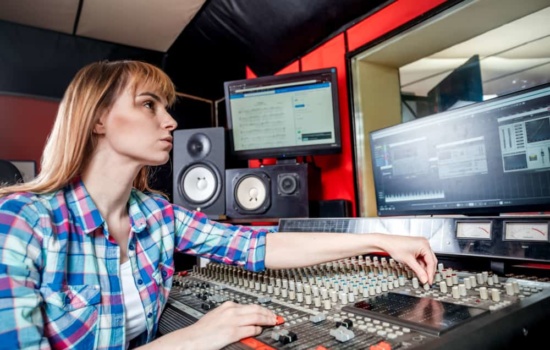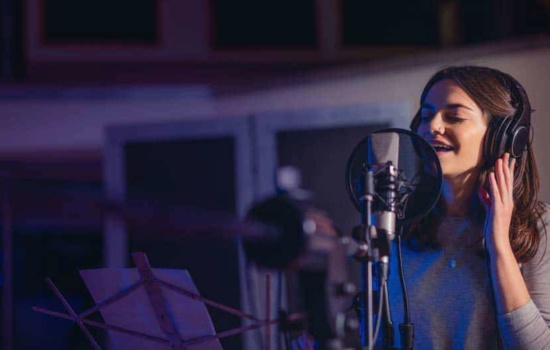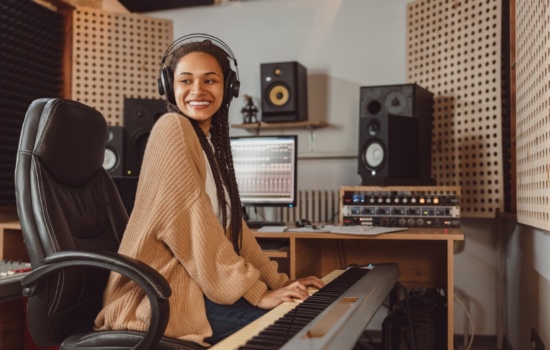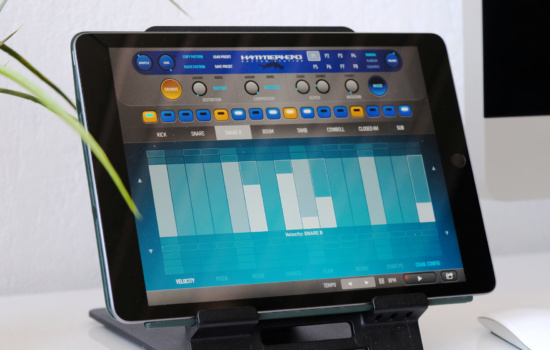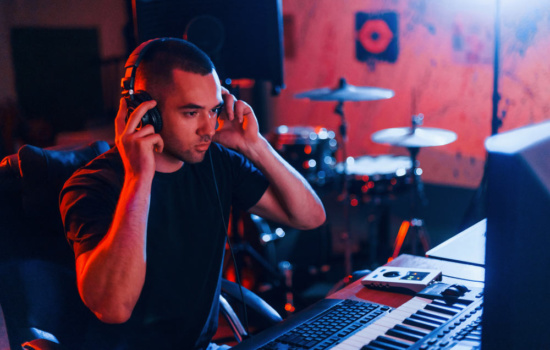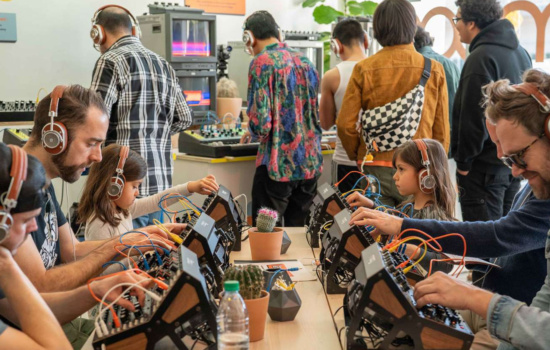Music Producer
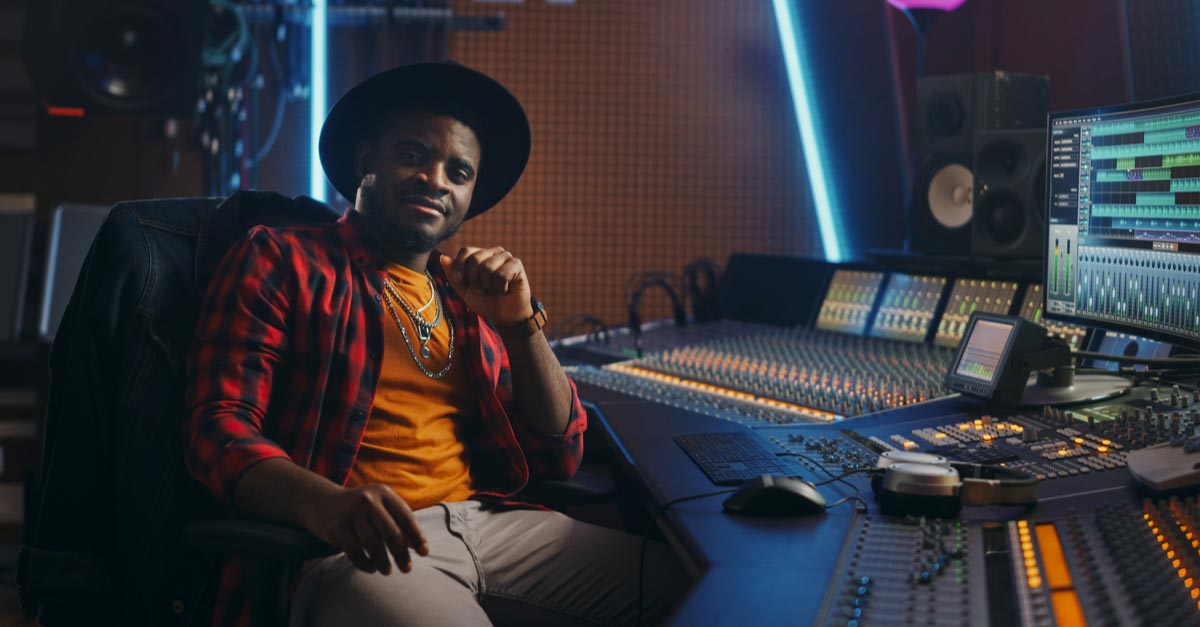
How To Become a Music Producer
People also ask
Career Description
Music producers, also called record producers, bring the vision of a recording to life. Producers are responsible for determining and leading the creative and technical aspects of recordings, whether for a single song, an album, or a soundtrack.
There are many kinds of producers. The executive producer secures and manages the budget while overseeing the entire project using an entrepreneurial approach. Record producers typically work in the studio with artists, musicians, and audio engineers to create and sonically shape the finished tracks. They might help to choose or even write the music, hire the musicians, book the studio, manage the schedule, and coordinate the many details required to move the recording forward to completion.
Other types of producers include vocal producers, who coach singers to give their best performance, arrange music for vocalists, and sometimes even sing on tracks. Some producers are also songwriters or composers who produce music for themselves or for others. They might also work as co-producer, engineer, and perform on recordings.
A producer could be independent or be employed by a music production company creating music for use in advertising, film, live shows, streaming, or for release through a record label with active distribution. They might work for a tech company like Google, a major entertainment company like Disney, a publisher like Universal, a TV or Radio outlet, or for a school or large university. Though it is a hypercomepetive field, there are many opportunities for music producers available.
Some producers are familiar names while others work behind the scenes and are not well-known by the public. Producers work in every genre of music and may specialize in one or in many styles. There are as many types of producers as there are people doing it, and there are many successful producers making a name for themselves in the music industry today. You could be next.
Over the past years, there’s been an increasing interest in music production and in people wanting to learn how to produce music. There are many career opportunities available to talented and skilled music producers. To learn what it’s really like to work with artists in the studio, we spoke to several music producers working in a variety of genres and locales.
In this article, you’ll hear from:
- Zev Feldman (record producer, co-president of Resonance Records, consulting producer for Blue Note Records)
- Matt Ross-Spang (record producer, engineer, mixer at Southern Grooves Productions)
- Trina Shoemaker (mixer, record producer, sound engineer for QOTSA, Sheryl Crow, Brandi Carlile)
What does a Music Producer do?
Music Producers cover a wide range of roles. There isn’t a specific job description that applies to every Producer. I will describe what I do as a Music Producer. It is important to note that I am also the Recording Engineer and Mixer on all of my productions.
Below is a list of most, but not all, of the duties that are required of me:
- Receive artists’ demo tapes and determine whether or not I would be a good fit for this particular artist.
- Help the artist choose the songs that will be on the record.
- Work with the artist on song arrangements (i.e., if the chorus needs come sooner or if the bridge should be longer or if the solo is too long, etc.)
- Work with the artist on production arrangements .(i.e. Should there be strings on this song? Should there be electric guitar or acoustic guitar or both? Should the song be dreamy and ethereal or punchy and in your face, etc.)
- Help the artist choose the appropriate musicians to cut the record with (if the artist is not a band).
- Submit a budget to whoever is financing the record (individual or record label, etc.)
- Confirm that the funds actually exist and are ready to be dispersed.
- Determine the best location to cut the record (meaning what city).
- Determine the best studio to cut the record in.
- Determine the schedule and book the musicians and studio.
- Track the record. (This can take anywhere from five or six days to five or six months. For big records, we usually spend about three weeks in the tracking room.)
- Mix the record.
- Help the artist determine the sequence of the songs.
- Master the record and prepare it for release.
In music producing, you wear multiple hats. It also depends on what genre you’re working in. Typically, like in a rap or hip-hop session, the Producer might be the guy who’s making the beats as much as playing the instruments and building tracks.
In country music or rock music, the Producer is the person who runs the session in terms of picking the studio, the players, the artist’s songs. They might do the arrangements–kind of like the final say on performances. That can change by the artist, too, so it’s not really anything that’s set in stone, and it’s changed over the years. It’s always morphing and changing a little bit.
And like I said, it depends on the artist. Some artists want the Producer to make all the decisions, and then some artists are very heavy-handed and make a lot of decisions, and the Producer helps them achieve that.
In my case, which is pretty unique, I travel the world, working with the heirs of iconic musicians of the past, and visiting recording archives. My goal is to identify great recordings that have never been issued before. Once I’ve found something interesting, something that strikes me as worthy of being released, then I work to arrange for the release of the material on LP, CD, and digital formats.
I’m a music lover and collector first and foremost. I have been into jazz since my teenage years. I have had lots of different experiences in my nearly 30-year music career and I’ve been proud to carry these experiences with me on my journey.
The term Music Producer has a lot of different meanings to different people. In the days when records were predominantly recordings of musicians playing or singing in a studio setting, it meant someone who conceives of a recording — selecting musicians and repertoire — who finds a label to put it out and then supervises the recording sessions. In recent years, with the advent of digital productions that are more heavily focused on electronics, the term, Producer, has often been viewed as more of a DJ figure or Engineer whose expertise is more in digitally manipulating sounds and beats.
I should note, both of these rely heavily on the Producer’s repertoire sense. There’s no such thing as a great record without a great song, just like there’s no such thing as a great movie without a great script. Whether the final product is a recording of live music or a digital sound creation, the Producer will necessarily be someone who puts together the deals with the artists and the labels involved.
Long story short, there are all sorts of different things a Music Producer can and does do. In many ways, people can determine their own paths to becoming a Music Producer based on their interests and strengths.
As a music producer, you have many roles, which can vary depending on the genre. But the main goal of a producer is to guide the song to its truest and strongest form. This is usually a collaborative effort between the producer and the artist.
Technically speaking, the music producer’s responsibilities involve:
- Listening to an artist’s demo tapes to see if it’s a good fit
- Estimating the amount and time of work the production project will take
- Sending invoices and collecting payment
- Providing or choosing a location to record and mix the song
- Helping the artist choose the right musicians for the track
- Collaborating with the artist on song arrangements and flow
- Deciding on what instruments should be played where
- Oftentimes engineering as well as producing
- Helping the artist select the songs for the record
- Mixing the song
- Mastering the song or recommending a mastering engineer
How do you become a Music Producer?
I became a Music Producer by first becoming a Recording Engineer — not everyone enters production this way. Some Producers are artists and/or Writers and approached production from that angle.
When I began my career back in the 1980s, there were no recording schools or universities with music production programs. You had to start in a studio as a Runner — in my case as the cleaning lady — and learn the trade the old-fashioned way.
It is important to remember that back then, there was no such thing as digital recording and no one had studios set up in their homes—there was no internet. It was an analog world.
There’s not just one way to become a Music Producer. A lot of times Producers are musicians, but for me, my entrance was a little different than for most. I’ve always had passion for music, and dreamed about making records, but never knew how to get there. I spent the first 14 years of my career in music as a Sales and Marketing Executive, dealing with merchandising records to end up in the retail marketplace.
In 2009, I began working with George Klabin at Resonance Records. Mr. Klabin was surprised to hear that I had never produced records before, considering that I had such a deep knowledge of music history. He made me a proposition: if I could find music that had not been out before and he liked it, he’d allow me to produce it for the company.
I did a lot of research finding individuals who inhabited this world of archival jazz recordings, and it was propelled by my self-interest. Again, these were things I had dreamed about, but didn’t know how to get there.
I got into music playing guitar, and playing guitar got me into the studio one day. When I saw the guy recording everything, I immediately knew that’s what I wanted to do. Then I became a Recording Engineer, interned, and worked my way up.
As you are working in the studio recording, you work with different Producers. Bands would bring in Producers, or they wouldn’t bring in a Producer, and you realize how important a Producer can be. There are times when the artist is doing everything themselves, and they don’t need a Producer. I saw all that.
For a long time, I actually had no interest in producing. I just really liked recording, but it got asked of me more and more. Then there were times where someone didn’t have a Producer, but they obviously needed someone to have their back in the way a Producer would, so I would step in that role.
Now I get called for that just as much as I get called for engineering, and usually, when I’m producing, I’m also engineering.
Can anyone be a music producer?
If you are physically and mentally capable of using recording equipment and playing an instrument, you can be a music producer. You just need a clear plan forward, the basic equipment, and a way to find clients and you can start building your career as a producer.
Salary
- Total Pay Range
$66K – $123K/yr
- Base Pay
$49K – $91K/yr
- Additional Pay
$17K – $32K/yr
- Estimated Most Likely Total Pay
$88K/yr (average of 25th to 75th percentile)
According to Glassdoor, the estimated average total pay for a music producer in the United States is $87,929 per year in 2024, with an median salary of about $71,000 per year. Producers also earn additional pay from various commissions, bonuses, and royalties, ranging from about $17,000 to $32,000 per year on average. Actual pay depends on years of experience and the industry producers work in.
The most successful music producers can earn tens or even hundreds of millions of dollars. They collect recurring royalties from the master rights to their recordings, which is a separate copyright from the song or composition copyright. (Note that in this context, the words copyright, rights, and royalties all mean the same thing: money).
For more on music licensing and recording copyrights, see our blog here.
Producers of hit songs command high fees for their time and services to an artist or client. There are producers who will work on a project fee-only basis (called “work-for-hire”) but most producers will keep ownership of their recordings so they can collect royalties if the song turns out to be a hit.
Without exception, the most successful producers didn’t start out earning millions of dollars and commanding high fees. They had to prove themselves first and become well-known in the music industry. For example, in 1982 music legend Quincy Jones produced one of the best-selling albums of all time, Michael Jackson’s Thriller, and today he is worth about a half-billion dollars. He didn’t start out that way, of course.
After attending Berklee College of Music in Boston during the 1950s, Jones first worked as a jazz arranger and trumpeter for various bandleaders, including Lionel Hampton, Count Basie, Gene Krupa, and others. He even played trumpet in the studio recording orchestra backing up Elvis Presley. Then he formed his own 18-piece jazz group and toured across Europe to glowing reviews and accolades, but went broke in the process, since the performance fees couldn’t support such a large group.
It wasn’t until the 1960s that Jones achieved the first of his big breaks as a producer, becoming the first African American vice-president of the Mercury record label. He went on to produce many legendary recordings for artists such as Frank Sinatra, Sarah Vaughan, Peggy Lee, Ray Charles, and Dinah Washington.
Later he also produced music for major Hollywood soundtracks, TV shows, and film musicals like The Color Purple, The Fresh Prince of Bel-Air, and The Wiz, respectively. He also produced the 1985 mega-hit song featuring most of the top music stars of the time, “We Are The World,” to raise money for victims of a deadly famine in Ethiopia.
At the same time, there are teenagers who start out making recordings on laptops in their bedroom, learning to produce quality music before taking on any paying clients. This is now possible thanks to recording software which can accomplish on a single computer what used to require a fully outfitted recording studio.
To learn how to set up your own home recording studio, see our blog here.
In the beginning, it’s important to collaborate with other musicians to create a portfolio of quality work to show prospective clients. These clients will most likely be other artists or perhaps songwriters who also need to build a portfolio of their own work. This means the budgets will usually be small or even non-existent.
Beginning producers should strive to work as much as possible so they can build their skills and their networks. Taking pride in the work by making it as good as it possibly can be is one key strategy to increase earnings.
There are many producers earning their living producing music right now, so it is certainly possible to make money as a music producer. Earning larger sums of money depends on building an ever-expanding circle of music clients and collaborators, while continuously improving one’s skills and quality of work.
How much does a Music Producer make annually?
Producers make between zero and tens of millions of dollars. I’m not being oblique. There is no way to answer that question.
But I can tell you that over my thirty-six year history in this business, my income would be averaged between $70,000 to $130,000 per year. Some years I made far less than $70k but I have never brought in more than $130k in a single year. The first decade of my career, I was lucky to earn $15-20,000 per year.
You need to be open and amicable to all the different ways there are to be paid for what you do, whether it’s with money or something else. There’s no guarantee of any range of money.
It also depends where you live–how big the music scene is and what genres you’re working in. You’ll often have one or two other jobs as you’re beginning your career in the music business. There’s nothing easy about it. There are no guarantees to any part of it.
This isn’t like being a Doctor or a Teacher. You’re self-employed. There are so many things about the music business that are different from other businesses.
You’ll easily work over 40 hours a week no matter what level you’re at. No matter if you’re just starting out or if you’re at the top of your game like super Producers Mark Ronson or T Bone Burnett…Those guys don’t do just 40-hour weeks. Certainly, they can afford to take vacations, but when they’re working, they’re working long and hard. And there’s no overtime.
The thing about starting out in the music business is that you’re wearing multiple hats. I’m not always producing. I might be mixing, engineering or songwriting. If you’re co-writing a song with somebody, you’re not getting paid to do that. The song might never come out, so you never see anything of it. But the song might come out, be a hit, and then years later you actually see some money from it. Or you might do a record for free just to help someone out and get your feet wet. Years later, they might call you to do another album, and then you’ll get paid for that one.
Even when you work on a larger budgeted album, sometimes it takes six to eight months to get paid after the project. It’s not like when you have a Plumber come, and you pay them right when they’re done with their job. Sometimes it’s weeks or months later that you get paid, or there are jobs you do for free with the hope that you get paid to do the next one.
It all depends on the company you work for and what kinds of projects they’re working on. It can vary greatly. But it shouldn’t be about the money. If someone asked me for a job and was only concerned about the money, I wouldn’t hire them unless they were already successful (and in a case like that, I’d probably have approached them, not the other way around).
But if it were a Producer just starting out who asked me about money, I would turn tables on them and say, “How much would you pay to do the job?” For me, I love it so much I would pay to have the opportunity to do what I do.
If you’re in this job seeking big money, you’re in the wrong field. Things naturally progress over time, and you’ll get promotions along the way and build a career, but if you’re always looking for the next business move instead of concentrating on the music, you’re never going to feel fulfilled.
How do music producers get paid?
The two main ways a music producer gets paid are from an upfront fee and from backend royalties. Depending on your experience and skill as a producer, you can charge an upfront fee of anywhere from $200 to thousands of dollars per song. Additionally, you can ask for a percentage of the publishing rights, which would earn you performance and mechanical royalties. Your cut of the royalties can vary widely, but it’s common to get 3-4% of the royalties of a song you produced. To collect these royalties, you need to be registered with a Performance Rights Organization and a publishing admin company (which should partner with the Mechanical Licensing Collective for mechanical royalties).
Getting Started
While there’s no real agreed-upon blueprint for how to get started, most successful producers will recommend various steps to prepare to enter a competetive profession. Consider the following approaches to help you get your bearings.
- Focused Listening
Learn how to recognize and analyze different components of recordings, such as the arrangements, instruments used, orchestrations, drums, basslines, form, melodies, harmonic setting, and recording and mixing techniques. Pay attention to signal processing effects (FX) like reverbs, equalization (EQ), gates, panning, and vocal processing. Through listening, you can learn much about how music is put together and recording methods. You can also read about it in articles, books, and blogs.
- Learn an Instrument
Knowing how to play an instrument well can help you to understand melodies and how music is put together, and allows you to experiment with chord progressions and song structure. Playing an instrument (like a keyboard) that hooks up to MIDI can also help you to play parts directly into your recordings and edit them later.
- Know Music Theory
Learning music theory is useful and important for its own sake, and theory knowledge is super-important for music producers to have, especially if you are also a songwriter.
- Songwriting and Composing
Writing is an crucial part of producing music because you need to understand musical forms, song structures, and how harmonies, melodies, and rhythms work together to create beautiful songs and compositions. It’s also important to learn about chord progressions and how to arrange music for different instrumental settings.
- Writing Hooks and Lyrics
Knowing how songs are structured includes understanding the most important recurring parts of the music that listeners tune in to, which could be in the chorus and might also have a lyrical component, depending on the style of music. Writing good hooks and lyrics is a special skill, and producers utilize it to create memorable recordings.
- Gear
Knowing the tools of the trade means having access to the right equipment. Knowledge of DAWs, microphones, interfaces, MIDI controllers, and computers is essential, and it doesn’t need to cost a fortune to get a basic setup for a producer.
- Set Up A Studio Space
You need a place to work in. Setting up a home studio can be a great way to get established. Read our blog here to find out all you need to know to build a home studio on a budget, starting today. If you don’t have the space at home, consider renting a space or sharing with other musicians.
- Do It With Others
Find other musicians and artists you can collaborate with on recordings. Make connections with artists and bands and initiate recording projects. You could approach a local band or artist who plays live, use social media, attend a music coferences, or look around your local schools to find musicians to record with.
- Networking
Become a master networker. Opportunities always will come from your professional network. Start to day, and learn the ins and outs of networking.
- Improve your Craft
Learn all you can about recording, mixing, and mastering. Learn about the music business. Remember the 4 Ps: Persistent Practice leads to Perfect Performance. Do something every day to improve your skills and knowledge about producing music.
- Get Your Music Out
Sign up for a digital distribution service to get your music on streaming services. Use Spotify for Artists to get added to playlists. Network with music publishers, music supervisors, and music publishers. Put your music on Marmosetmusic.com to reach digital media creators looking for tracks. People need to hear your music for you to succeed.
- Create Your EPK
An Electronic Promo Kit (EPK) is crucial so that industry people can quickly understand what you do, hear your tracks, and read your bio and any press.
These are some of the steps to consider as you prepare for a career as a music producer.
Hey, what do you think about trying our new Music Career HelperMusic Career Helper really quick? It’s totally free and could help get your career moving fast! Give it a try. It’s totally free and you have nothing to lose.
Career Outlook
Becoming a music producer can lead to a terrific career. People who are passionate about music and technology can build and sustain a viable career over time. It’s not something that’s likely to happen overnight, however.
Being dedicated and serious about producing the best work possible will help sustain and grow your career in music production. If you are interested in a career as a music producer, study up on what’s involved, including the creative and technical aspects, and learn how the music business works.
The good news is that there will always be a strong demand for talented and skilled music producers because there is always going to be a need for new music. Audiences and fans are never content to just listen to the songs from yesteryear, and there will always be new up-and-coming artists who need a producer to help them realize their artistic and career ambitions.
Since a producer has so much input into the sound of the final recording, the role is important to shaping the vision for the creative process. This is a source of great personal artistic satisfaction. The goal of a music producer is to produce music that sounds good to their own ears, in the hope that others will also like it. A successful producer is a skilled team leader, able to pull people together to achieve great things.
Having an active network comprised of other music industry professionals is an important aspect of building a solid career as a music producer. Building your network takes time and effort, but is well-worth it since it’s how you find work as a producer. The great majority of opportunities come through your professional network.
Most work comes through word-of-mouth. One way to learn more about the industry and role of a producer while broadening your network is to join professional associations and attend conferences and events. The Audio Engineering Society (A.E.S.) and The Recording Academy (GRAMMYs) are good places to start.
Another way producers get their work and increase their network is by hanging out where musicians congregate. Usually, this means being in a large city, or perhaps being enrolled in a college or university program.
Visiting clubs where musicians and bands perform, finding jam sessions or coffeehouses where musicians congregate, and playing an instrument or singing in a band are great ways to get introduced to musicians and aspiring artists who may need a producer.
Another great way to learn and find work is by interning or apprenticing with an established producer or at a recording studio or record label. There are also professional musicians working in church and community organizations. A producer can sometimes make great working connections just by being around other musicians, making new friends.
While the outlook for music producers is very good, there is always competition, since many people want to become music producers. Starting out, you will need to be persistent and work hard to acquire the necessary skills and contacts to make it in the industry.
How hard is it to become a Music Producer?
It’s extremely hard. It’s hard to do anything in music. It has to be your number one love. Studio recording is not only my job but also my favorite thing to do.
Obviously, I do other things for fun, but this has somewhat consumed me. I’m not at all complaining about that. I think about how a lot of people will work a nine-to-five job so they can go do something fun on the weekend, but the music business is not that. It’s not a nine-to-five job.
Sometimes you work through the night. Sometimes you work months without a day off. It’s because you love what you do. If this isn’t 100 percent your passion, it’s probably not the right thing for you.
There’s no clear-cut path. There are no footsteps you can follow. There’s no trail to get where you want to get. It’s different for everybody. There’s luck, where you’re located, how talented you are, et cetera. There’s no easy path or even hard path that you can just start walking.
You’ve just got to figure it out and really go for it. Throw yourself out there. Work hard because there’s always someone better than you, and even if someone’s not, they’re working harder than you.
It was very hard to become a Producer. I worked 10-15 hours a day for very little pay and no health insurance.
It is different now. You almost have to start in a university music program because the recording world is mostly digital and all Producers have to be well-versed with recording platforms (Pro-Tools, Logic, etc.) I started in a simpler time.
You have to make a name for yourself and be able to prove yourself. For me, it wasn’t easy. Since my experience up until that point had me only working in the sales and marketing divisions of the companies I worked for; at those companies, I had no way of being able to work on an actual production. It wasn’t interchangeable between the sides. If you worked in sales and marketing, you don’t work on productions.
So when George Klabin gave me the opportunity to produce projects for Resonance, I jumped at the chance. I enjoy my job so much it doesn’t even feel like work for me. But it is hard. So many people dream of being a Producer and there’s a lot of competition. If being a Music Producer is your goal, then first, you have to identify what you have to offer as a Producer.
And you have to constantly be looking for opportunities, you have to find ways to meet people in the business and when you meet them, you have to have something to show them that will be impressive. Above all, you have to be tenacious and believe in yourself.
Do producers own masters?
Producers don’t typically own 100% of the master rights of a recorded song or anywhere near that percentage. It’s common for a producer to get a much smaller percentage of the publishing rights to a song they produced, usually 3-4%. So technically, producers do have part ownership of a master, but it’s not enough ownership to have any say in where the artist or label wants to publish the song.
Career Path
Many musicians further their journey of becoming a producer by enrolling in a college or university music program, and there are many excellent programs available for aspiring producers. Studying music is strongly recommended since it provides a foundation for understanding everything required to learn music production.
There are both undergraduate and graduate-level programs in music production offered all around the US one could choose from. If music school isn’t in the cards, studying privately with someone, learning an instrument, and getting familiar with using Digital Audio Workstation (DAW) software would be a good career entry point.
It’s important to be able to play an instrument (voice is also considered an instrument) and know music theory to fully understand the creative process involved with making music.
Whether recording acoustic instruments or using synthesizers to create new and unusual sounds, future record producers should be experimenting with the recording process daily. The more time spent “fooling around” and learning to create and record music, the quicker the needed skills and knowledge can be acquired and assimilated. Besides, it’s fun! Once a good skills level has been reached, a new producer should begin offering their services to other musicians, even if for free at first.
As with any aspect of the arts as a career, there’s a starting point, and unless you’re exceptionally talented and lucky, you won’t likely be earning huge money right out of the gate. The important thing at outset is to affiliate and collaborate with other musicians to get a foot in the door.
Most artists, including producers, must support themselves with a “day job” when starting out. The important thing is that a day job should pay living costs and be flexible enough, while not being so demanding or tiring that it leaves no time and energy for producing music.
Once you have a certain amount of experience and has built up a good portfolio, you can pursue better and more lucrative opportunities. While some people never get out of the day job routine (maybe because they like it or need benefits like retirement accounts and health insurance) many producers can usually transition to full-time work in music within a few years of starting out.
From there, having a strong professional network that is always expanding is the key to getting really great opportunities. Building up a catalog of works, establishing a career and reputation as a top-notch music producer by working hard and constantly improving, while at the same time finding new clients and collaborators, should be a full-time job at this stage.
Some producers work for a record company in A&R, as an entrepreneurial music executive, or hold some other music industry role such as in publishing or music supervision. Or they may even become recording studio or live music venue owners.
Some producers work as DJs where they create original music and create live mixes at raves, clubs, and shows. Many producers have gone on to start their own record labels. Good producers, once established, will have the choice of a variety of industry roles.
There are many paths to success as a music producer. It may be a challenge to map out a career path as a producer in advance, but as time goes by it becomes easier to survey the landscape for openings while understanding and evaluating opportunities. Studying the career path of other successful producers is one way to gain a deeper understanding of available opportunities, and to learn how to take advantage of them.
Steps To Become a Music Producer
1. Get the necessary equipment and software
To be able to produce music for clients, you’ll need a basic recording setup. It doesn’t have to be fancy, but it should at least include:
- A desk and office chair
- A laptop computer that can run your chosen DAW
- A decent microphone, XLR cable, and mic stand
- A simple audio interface
- Monitors and headphones
2. Produce a few of your own songs
Before you go out and get any clients, you’ll need to show people what you can do. So produce some of your own songs and distribute them so you have something to share. Just make sure it’s some of your best work that accurately showcases what you can do.
3. Create a website
You’ll need a place to send potential clients where they can hear your work, see what you offer, and contact you. So set up a basic website that includes:
- An introduction of who you are and what you offer
- A clear way to contact you (like a contact form)
- A link to your work
- Links to your social media
4. Do 1-2 pro bono projects
Now it’s time to get a couple of clients – not paying clients yet. Offer to produce and/or mix a song or two for 1-2 artists for free. This way, you have more portfolio items and you have the opportunity to build relationships with indie artists who may come back and hire you again.
5. Put yourself out there
Next, it’s time to really put your work out there. Reach out to smaller indie artists you like on social media. Try using websites like SoundBetter, EngineEars, and even Fiverr. Start creating content (video, social media, blogs, etc.) that attracts musicians that may want to hire you.
How long does it take to become a Music Producer?
Again, there’s no exact answer for this question either. In my case, it took a long time — about 15 years — since I had started out on the sales and marketing side of the business. I had never worked on an actual album before then. But everyone has their own trajectory.
It took me ten years to go from an Assistant Engineer to the Lead Engineer and another ten years before I started producing records.
I don’t think you’ll ever wake up one day and go, “I’ve learned enough to be a Producer now.” A lot of times you throw yourself into the fire or you get thrown into the fire, and that never goes away even once you’ve established a career. You still need to continually push yourself and learn new things.
You’ll never stop learning. Hopefully, you never stop paying attention, and you grow as well as your career. I learn something new at every session. You can’t cookie-cut a production and apply it to different artists. With every artist, record, or even individual song, you need to approach it differently. Sometimes you don’t find that out until you’re a couple days into a session.
I still love recording and working with other Producers because I see what I like and don’t like about how different people approach different things. You can apply that to your own workflow.
You really need to be a people person. You really need to be a good listener. And you really need to gain people’s trust and make them feel at ease.
You can know Pro Tools inside and out, have perfect pitch, or know every bit of music theory there is, but if people don’t enjoy being around you or trust you–or you don’t know how to talk to people–you won’t get called.
Who is a famous music producer?
One of the most famous music producers is George Martin, who engineered and produced several of The Beatles’ albums. Other famous producers include Rick Rubin (Tom Petty, Metallica, Kanye West), Dr. Dre (N.W.A., Snoop Dogg, Eminem), Brain Eno (David Bowie, U2, Coldplay), and Quincy Jones (Michael Jackson, Aretha Franklin, Frank Sinatra).
Experience & Skills
What skills does a music producer need?
- Playing an instrument
- Writing music
- Studio engineering
- Arranging
- Time management
- People skills
- Business skills
Starting out as a producer means mastering many skills from the musical to the technical, the business, and even the legal aspects of the music industry. Producing music is both an art and a craft. For starters (and not in any particular order), attention should be paid to the following areas:
Playing an Instrument
Voice is considered an instrument, and a vocal producer should also know about all aspects of singing, including how to create vocal harmonies. Many vocal producers are also great singers and might also play an instrument such as piano or guitar.
The advantages of playing piano or guitar include being able to play chords and hear the harmony together with the melody. There are also great producers who play violin, trumpet, drums, or bass. Any instrument will do if one is proficient.
Some producers who don’t play a conventional instrument use the computer as their instrument (sometimes referred to as a digital musical instrument or electronic digital instrument–this is especially common among producers who also create beats and loops for rappers). Many of the sounds heard in today’s pop music are indeed created by music synthesis and DAW software programs that can be run on a laptop. Digital musical instruments (DMI) also include pad controllers and different types of (MIDI) keyboards.
The reason producers should play an instrument and know music theory is so they can effectively communicate with musicians about the music being recorded. Musicians have a shared “lingo” and use special terminology that non-musicians would have difficulty understanding. As a producer, it may be important to have the ability to describe music in terms the musicians can understand and relate to.
There might be some producers who are not trained as musicians, but it’s relatively rare. Learning to play an instrument and understanding music theory go hand in hand for the musicians and music producers, giving them a shared language and understanding of the music to be recorded.
Writing Music
Like playing an instrument, knowing how music looks on the page offers another chance for shared understanding between producers and musicians. Being able to read and write music, while not a hard and fast requirement, will undoubtedly give the producer an edge.
Knowing note names on the staff, being able to decipher written rhythmic figures, analyzing chord progressions, and then arranging or orchestrating music for specific instruments as a group, are all standard knowledge for musicians and should also be for producers.
Ultimately, the producer must be the best musician in the group and be able to visualize all the parts in a piece of music. The producer must be able to see and hear the finished recording in their mind. Reading and writing music is often the best way to do this.
It’s also super-helpful to be able to prepare the written music for sessions. Since session musicians tend to read well, having written parts could save a lot of time, when “time is money” in a recording session. Sometimes it’s much harder, and consumes more time, to explain things verbally that could more easily be written out for the session musicians.
Even if the producer is not the arranger, they need to be able to look at any written arrangements of music to be played and understand what’s in them. If the producer hires arrangers or orchestrators, they should be able to communicate clearly with them on paper what the music should sound like.
Studio Engineering
The recording studios of today look quite different from the studio of 50 years ago. Since the introduction of MIDI (Musical Instrument Digital Interface) around 1980 allowed synthesizers and computers to be able to talk to each other, the digital revolution in music has come full circle.
Today, many producers still prefer to record using analog (tape) recording methods, since the sound is perceived as “warmer” and with a more well-rounded bass frequency response.
However, they will finally “dump” the analog tracks into a computer using a software program like Pro Tools in order to be able to digitally manipulate the parameters.
Once the music has been recorded, overdubbed, and mixed for stereo or surround sound, the music will then be mastered by a specialist Mastering Engineer to be tailored for the intended distribution format (vinyl, CD, or streaming services).
Many producers start out as recording engineers, working at mixing consoles and learning how to set up microphones for making live recordings in the studio. There are specialist audio engineers for recording vocals, or drums, and for mixing and mastering, as mentioned.
Working the knobs is a terrific way to learn about what modern recording environments can accomplish. Producers who know how to judiciously add effects (FX) to enhance the music, can layer tracks, overdub solos, create a rough and a final mix, and in general know their way around the gear will always be in demand. For the producer who is not so technically inclined, not to worry: cultivating an awareness of what the machinery can do, and what is possible, can be enough.
While many music producers are also engineers and can troubleshoot issues with recording hardware and software, not all are. Equipment is always evolving, and nobody can be 100% up to date on every new feature. Having a general understanding of how the gear works, and being able to troubleshoot the most common problems, will be a great asset for the non-engineer working as a producer.
Arranging and Orchestration
Many, perhaps most, Producers have a hand in arranging the music to be recorded. Arranging involves taking a musical work and adapting it for specific instrumentation. Arranging also might include writing parts of the music such as an intro, interlude, or ending, and ordering the sections of the song in the arrangement form. Many Songwriters come to a Producer with the basic song melody, lyric, and chord progression in place, but not much more. The Producer must typically then quickly make an arrangement of the song for the available instruments and to fill a specific time length. This is a valuable skill for any musician and particularly useful for Producers.
Many Songwriters don’t know how to arrange their music or are looking for someone else to do this for them, and the job often falls to the Producer. If there’s a big enough budget, and the music requires it, the Producer might hire a separate Arranger, but they still must be able to communicate to the Arranger what they feel the song needs.
Once there is an arrangement in place, and a key chosen, an Orchestrator will assign parts to different instruments based on the desired sound, ranges of the instruments, and overall tone of the music. For example, if there are live strings or horns being used, the Orchestrator will take the string or horn line (melody) and assign it to the different instruments in the section, sometimes harmonizing the parts. Many Arrangers are also Orchestrators, and many Producers can both arrange and orchestrate. This requires certain knowledge and skill, and with careful study and lots of experience, a Producer will get quite good at doing all these things.
It’s also helpful to be fast because sometimes arrangements and orchestrations must be done on the fly, when the timer is ticking down on a recording session. The best Producers can write, arrange, and orchestrate music very quickly, due to their depth of musical understanding and experience.
Time Management and Project Management
Time is money, and this is especially true during recording sessions, which always have a beginning and an end. The studio is rented by the hour or by the day, the musicians and the engineer are paid by the hour or the day, and when working with the best people it can get really expensive! Every minute has value, not only in terms of the money spent, but relative to the outcome of the session.
There’s only a certain amount of time available to accomplish all that needs to be done to create a beautiful, shimmering recording. It can be very frustrating when the inevitable problems pop up, and the experienced producer must be prepared to maximize the time allotted.
This means leaving extra time for solving problems. There are always problems. Things always take longer than expected. There’s even a name for this: The Planning Fallacy.
Producers need to be good at managing time, planning sessions, coordinating people and facilities, creating and communicating schedules to all participants in advance, double-checking and confirming with everyone, and being on time, every time.
It’s always better to be early. Sometimes there are problems that cannot easily or quickly be solved, and the producer makes the call to move on. Time management is a set of techniques, a special skill set, and an art form.
The best producers have strong time management skills, which are also a component of project management. Every recording is a project. Aspiring producers would do well to study up on time management and project management.
People Skills
When Quincy Jones recorded “We Are The World” with all those huge Pop Stars, he hung a sign up at the door to the studio which read: “Check Your Egos At The Door.” Indeed, dealing with different personality types and the powerful attitudes of temperamental artists and musicians can present a challenge to the most experienced producers and music directors.
Not only must the producer be adept at dealing with outsize egos, but they must also be good at conflict resolution. Being a strong communicator and negotiator helps gain understanding and agreement from participants about complex artistic and technical issues, and there are also specific techniques and etiquette useful for approaching and speaking with celebrities.
Perhaps one important characteristic of a good producer is having no temper, or at least having it always completely under control. A complete lack of any anger (or complete control over it) will help defuse most difficult situations one could encounter in the highly technical recording studio environment, while surrounded by difficult personalities with gigantic egos. When expressed, anger rarely gets the results desired. Experienced producers keep their cool under immense pressure.
People skills, a.k.a. “soft skills” are a kind of meta-skill that can be worked on in just about any situation. People skills are particularly important when working in groups. Paying attention to body language can give important cues about what is really going on.
There are all kinds of dynamics between individuals working in groups, and between different groups. The producer should strive to learn all about psychology, motivation, and effective communications, in order to cultivate sensitivity to group dynamics.
Fortunately, there’s a lot of research into soft skills that’s available and easily accessible. It’s worth making the time and effort to learn about and improve people skills.
Music Business, Legal Aspects, and Management
Returning to Quincy Jones losing money on his otherwise successful concert tour back in the 1950s, he told Ralph Gleason in an interview afterward:
“We had the best jazz band on the planet, and yet we were literally starving. That’s when I discovered that there was music, and there was the music business. If I were to survive, I would have to learn the difference between the two.”
Music producers operate in the creative, legal, and business spheres. It’s not enough to have the artistic and technical skills required to produce great music; a producer must also understand the laws, and then be the consummate business expert.
Andy Warhol said: “There is music and there is music business, both are to be taken seriously as an art form.” Understanding the basics of how the music business works is a requirement for anyone seeking a career as a music producer.
Legal and business frameworks include areas such as music copyrights, music publishing, music licensing, budgeting, finance, marketing, and business management. Music is a part of the larger entertainment industry and is connected to the leisure and media industries as well. Music producers need to understand all these areas.
Today, music is a global industry. This means that the successful producer should also understand cross-cultural business, international trade, and foreign market regulations.
Learning all about business and acquiring more than just the basic business knowledge and skills will be important to future music producers.
Education & Training
There isn’t any standard educational requirement for music producers, but employers usually look for a bachelor’s degree in music production or audio engineering, Many producers also studied music performance, music theory, songwriting, music business, composition, and music history in college.
Graduates of music schools will have specific knowledge in areas such as:
- Music performance
- Music theory
- Composition
- Arranging
- Conducting
- Songwriting
- Film scoring (or screen scoring)
- Audio engineering
- Sound design
- Digital audio software
- Legal aspects of music industry
- Copyrights
- Artist management
- Marketing and advertising
There are reputable fully accredited music production degree programs offered by top music schools in the US and a few abroad as well. The focus from school to school is different.
Some are more music-oriented and require applicants to play an instrument already, while others might be focused mainly on the audio engineering, music technology, and music business aspects of becoming a music producer. There are also non-degree certificate programs, and stand-alone courses available in-person and online.
Going to music production school can be a great way to learn the needed skills and technical aspects to becoming a producer relatively quickly, and to meet other future music industry contacts, but it is also expensive. For talented students there are almost always generous scholarships available, so don’t be scared off by a high price tag.
Education is expensive, mainly due to the high costs associated with hiring the best faculty and building and maintaining fully-equipped recording facilities. Yet many people find ways to pay for it and view school as a transformative investment leading to a future rewarding career.
Still, going to school is not the only way to learn. For some people, it might actually be better to just jump into the business at entry-level and learn on the job. It’s also possible to study privately with an accomplished producer, or work as an unpaid intern to learn the ropes and make the crucial contacts.
Having a degree from a top school might be the gold seal of approval in the industry, but clients and employers will still want to hear your work. This means applying the talent you have with hard work and continuous improvement and refinement of your key skills.
Most people will need training to achieve a lasting career as a music producer. There’s a lot you can learn on your own, and school is never easy, so it really does come down to persistent hard work, dedication, and then letting your work sing your praises.
Networking in the music industry is another key to success. It’s who you know that matters, but even if you don’t know anyone right now you can always take the right steps to meet them. Be positive about the future, the future of the music industry, and your own future, too.
Never compare yourself to others. Becoming a music producer is a lifelong endeavor to always be better than you were yesterday, through constant learning, hard-won experience, steady training, and building a strong reputation as a musical force to be reckoned with.
What should I study to become a music producer?
First and most importantly, you need to know the ins and outs of your chosen digital audio workstation (DAW). Pick one of the most reliable ones, like Logic, Pro Tools, Ableton, or Reaper (my DAW). To start, you’ll need to know how and why to use EQ, compression, reverb, and delay. Then study professional producers, dissect their tracks, and emulate the techniques they use. You don’t need formal training, but going to music production and engineering school can help. However, many full-time music producers today are self-taught or mentored with an experienced producer.
FAQ
What else do you think aspiring Producers should know?
The great thing about the music business is that–because the money isn’t great or guaranteed–most everyone is in it because they absolutely love what they do. In our business, that is awesome because you’re helping to make people’s dreams come true. It’s an amazing good karma thing. You build up these amazing relationships in short periods of time, and most gigs come by word of mouth. It’s artists who enjoyed working with you who tell the next person about you.
The best advice I can give is to do your best on every single thing you can, and say yes to as much as you can. Be the best person you can be at all those gigs because you never know when the one gig you do for free turns into something big or who was at that gig who’ll call you later. And the more you can leave ego out of this job, the better you’ll be for it.
If you go to Nashville, pretty much every major label has offices there. There are Songwriters, Publishers, Managers, and Booking Agents. It’s the same in L.A. and New York. Those are great places to go to get into multiple areas of the business, but they’re also oversaturated with so many people with the same dream. Whereas in a city like Memphis, there’s much less of the business side, so it’s people who just do what they love. But it’s also a harder path to get to higher levels of the business.
Also, the business is different nowadays than it used to be. The Producer wasn’t the Recording Engineer, but now it’s very normal for a Producer to be hands-on in the studio. Music Producers need to know Pro Tools and the technical side of the business as well.
The best place someone can go to learn is The Blackbird Academy in Nashville. It’s run by Mark Rubel. It’s a six-month course, but they do even two-week classes for high school students. Students can go for two weeks and see if they still want to be an Engineer or Producer.
Then they can do the six-month course. They’ll be in this huge studio where they might run into Kenny Chesney or Kings of Leon. They all record in this studio, and students get to sit in on some of the sessions. They have amazing guest speakers and travel to other studios. It is one of the best schools you can go to. If working in a studio is specifically what you want to do, Blackbird is perfect. They’ll help find internships for you, too, if you work hard.
Then there are video series. There’s Puremix that shows the workflow of bigger Engineers. You can download multi-tracks from Green Day or someone else they’ve worked with. You can watch them mix it and play with the files.
But I think the problem sometimes with people who watch those websites is that they try to emulate these people. You need to find your own voice. But it’s good to watch multiple people and how they attack things.
If you want to become a Music Producer where would you start?
Start by learning how to use your DAW of choice. Once you’re feeling comfortable with the DAW, start producing your own tracks and tweaking those. Ask for feedback from your fellow musicians.
When you feel ready, it’s time to start looking for your first collaborators. Talk to them about their expectations and what they’re looking for sonically. Keep working together until both parties are satisfied.
Keep in mind, you might be working for free as you continue to hone your Producer skills. After you’ve built up enough confidence and experience, it’s time to set up a website and start spreading the word about your services in your local scene.
Try posting on Craigslist or putting up flyers at local music scene hangouts like record stores, practice studios, and music colleges.
How competitive is music production?
Music production is super competitive. With so many more students attending recording and production degree programs, there are now more qualified individuals than ever vying for success.
It can be tough to find an opening at a recording studio, if you’re looking for in-studio work, or to build up a reputation and work with enough successful artists to raise your profile. Music production is quickly becoming a career field akin to acting, singer, or playing an instrument — many people dream of “making it” in these careers but very few will actually become household names.
That said, you can build up your own clientele and make a living working in music production. You will have to hustle and you may have to diversify your income streams. Very few people can expect to become the next Max Martin or Calvin Harris.
Sources
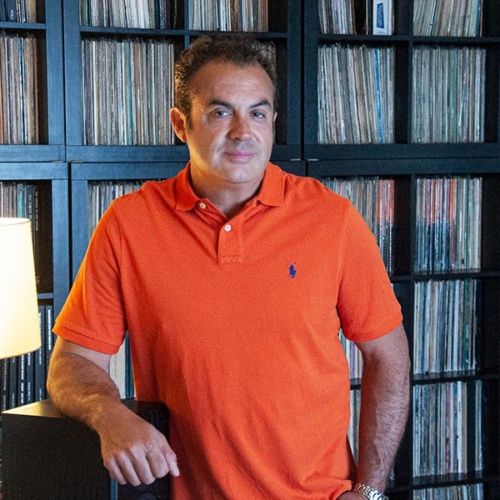
Zev Feldman
Zev Feldman is an internationally recognized, independent record producer and the co-president of Resonance Records in Los Angeles. He is also a consulting producer of archival and historical recordings for Blue Note Records. Over the last 25 years, he has worked for PolyGram, Universal Music Group, Rhino/Warner Music Group, Concord Music Group, among others.
He won DownBeat Magazine‘s International Critics Poll for “Rising Star Producer” in 2016 for his work on a staggering 26 historical jazz recordings that year and was called “the Indiana Jones of jazz” by Stereophile Magazine.
In addition to his lauded work at Resonance, where he works closely with the estates of jazz icons such as Bill Evans and Wes Montgomery, he’s also involved with various other labels covering jazz, blues, and rock including Elemental Music, Sunset Blvd Records, Real Gone Music, Reel To Real Recordings and others.
Zev is one of the co-producers of 2017’s highly acclaimed Thelonious Monk discovery, Les Liaisons Dangereuses on Sam and Saga Records, and another highly lauded Monk discovery, Palo Alto, from 2020 on Impulse! Records. Feldman is a native Washingtonian who grew up in the DC area, and is currently in Los Angeles where he’s resided for the last 15 years.
Photo credit: Zak Shelby-Szyszko

Matt Ross-Spang
Matt Ross-Spang is a Grammy Award-winning engineer, mixer, and producer. At the age of 16, Matt started as an Intern at the legendary Sun Studios and eventually worked his way up to chief engineer. During his time there, he endeavored to bring the recording studio back to its origin by finding, installing, and using the same period equipment that Sam Phillips engineered with in the 1950s. Matt and Sun were featured by Lester Holt for NBC’s Nightly News and the Today Show. NPR also highlighted his work on All Things Considered.
In 2015, Matt left Sun to venture out on his own as an engineer and producer. His first project was engineering and mixing Jason Isbell’s Something More Than Free for acclaimed producer Dave Cobb, which earned him his first Grammy. Around that time, Matt also engineered, mixed, and co-produced Margo Price’s debut album, Midwestern Farmer’s Daughter. Third Man Records released the record in 2016 to much critical acclaim.
Over the years, Matt’s worked with a variety of amazing artists, including John Prine, Jason Isbell, the Hi Rhythm Section, the Drive-By Truckers, Margo Price, Luther Dickinson, Lori McKenna, Anderson East, Elle King, Al Green, and more. In 2017, he engineered Jason Isbell and the 400 Unit’s critically-acclaimed and Grammy-nominated album, The Nashville Sound. He also co-produced and mixed Margo Price’s All-American Made. Matt’s home base is the newly renovated Studio B at Sam Phillips Recording in Memphis, TN.
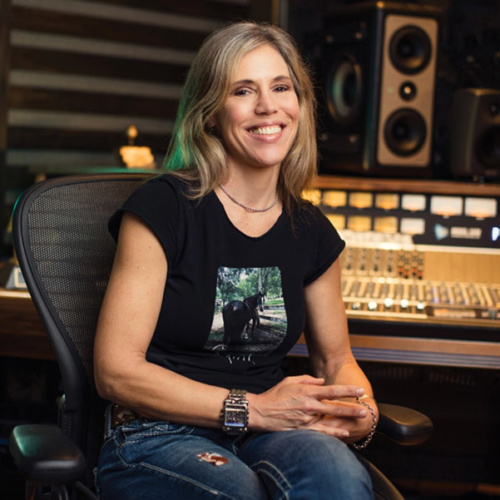
Trina Shoemaker
Trina Shoemaker was born in 1965 and raised in Joliet, Il., about 45 minutes southwest of Chicago. There was nothing she loved more than listening to her dad’s Hi-Fi stereo and comparing it with the other systems in the neighborhood. They were all good, some better than others. Her dad’s was the best and it was loud! By 13 Shoemaker knew she wanted to record albums, whatever that meant, and by 19, she had a little apartment in Los Angeles and an entry-level job at Capitol Records.
It would be a long road finding her way to a console. Her rather circuitous route to recording began in a basement studio in a London flat with artist Hugh Harris, then wound through Rancho De La Luna in Joshua Tree, and further on down to the Mississippi River Delta, where she began by cleaning studios in New Orleans. Eventually, she found her way to Kingsway, Daniel Lanois’ famed studio in the French Quarter where she was hired as a tape op and second engineer in 1991 and quickly became the house ngineer.
During those early Kingsway years, Shoemaker worked on Iggy Pop’s American Ceasar, The Throwing Muses University, Giant Sand’s Glum and Emmylou Harris’ iconic Wrecking Ball, among many others. In 1995, after completing Wrecking Ball, Shoemaker decided to leave Kingsway and strike out on her own. Within a few months she was hired by Sheryl Crow and over the next year recorded Crow’s breakout self-titled album featuring the hit songs “If It Makes You Happy” and “Everyday Is A Winding Road”.
They followed it up with The Globe Sessions in 1998 with Shoemaker winning two Grammy Awards® for Rock Album Of The Year and Best Engineered Album Non-Classical, making her the first woman to win the latter. During the late ’90s and early 2000s, she recorded Whiskeytown’s Pneumonia at Dreamland in the Catskills, Queens Of The Stone Age’s Rated R at Sound City in Los Angeles, Victoria Williams’ Musings Of A Creek Dipper in Joshua Tree and Something For Kate’s Echolalia in Australia.
In 2001, Shoemaker and Crow reunited for her fourth studio album C’Mon C’Mon, where Shoemaker was once again nominated for the Best Engineered Album Grammy Award®. In 2003, Shoemaker mixed several tracks for The Dixie Chicks and in 2004 she won her third Grammy Award® for her work on Steven Curtis Chapman’s album All Things New.
After Shoemaker lost her New Orleans home during Hurricane Katrina, she moved to Nashville along with her husband and 7-month old son. During her 5 years in Nashville, she produced, engineered, and mixed dozens of albums including Sunset Man by James Otto, which featured the #1 Billboard Country hit “Just Got Started Lovin’ You”. In 2010, Shoemaker and her family moved back down to the Gulf Coast where she built a mix room at her home and partnered with Jake and Luke Peavy, opening Dauphin Street Productions.
Trina was again nominated for Best Engineered Album Non-Classical in the 2013 Grammy Awards® for the album The Moorings by Andrew Duhon, in 2015 with Brandi Carlile’s Firewatcher’s Daughter (Best Americana Album), in 2017 with The Secret Sisters’ You Don’t Own Me Anymore (Best Folk Album), and took home her 4th Grammy® Award in 2020 for Tanya Tucker’s While I’m Living (Best Country Album).
Trina lives with her husband, musician Grayson Capps, their son Waylon, and a mess of dogs, cats, and horses on Mobile Bay in Fairhope, Alabama.
References
- 1Multiple. "Music Producer Salaries in United States". Glassdoor. published: February 10, 2024. retrieved on: March 23, 2024
- 2Dave S.. "These are the salaries of some of the top hip hop producers". Produce Like a Pro. published: 14 September 2017. retrieved on: 24 August 2021


